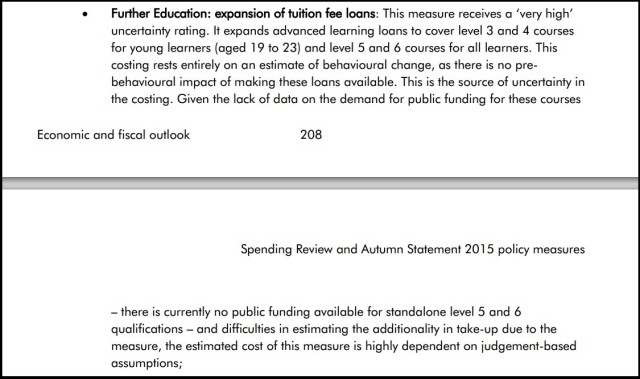Doel stepping down as Association of Colleges boss and moving to new FE professorship
Martin Doel will be standing down as chief executive of the Association of Colleges (AoC) from September to move to a new professorship for the Further Education Trust for Leadership (Fetl).
Mr Doel will continue in his post with the AoC until September 1, while also helping to establish his new role as Fetl Professor of FE and Skills at the University College London (UCL) Institute of Education (IOE) from April 1. He will start full time in the professorship role from the start of September.
A Fetl spokesperson said that he “will take up the prestigious role on April 1 on a partial basis moving to full time in September 2016”.
“It is the very first professorial role for the sector and will help lead thinking to influence policy and help shape the future for FE and skills,” he added.
Mr Doel said: “Working at the AoC has been the most rewarding job that I have had.
“I am immensely proud of the service my colleagues at AoC have provided to colleges and their students over the past years and I look forward to continuing to lead them over the next 10 months.
“In my new role on behalf of Fetl in the Institute of Education, I will look to draw on my experience at AoC to continue to enhance understanding of the FE and skills sector,” he added.
“I will do all that I can to help the sector to navigate the way ahead as it seeks to meet the needs of students, employers and communities in the same responsive and high quality way as it has always done.”
A spokesperson for the AoC said that it “will undertake the process of appointing a new chief executive in January 2016” to ensure a “thorough period of succession planning and handover for the new post-holder”.
Dame Ruth Silver (pictured right), DBE, president of Fetl, said: “Our mission is not to develop the practice of ‘doing’ leadership, it is to develop a specific dimension of leadership, and that dimension is thinking.
“So that’s thinking about other ways of doing, but also thinking about other ways of being, in order to shape the future to which we are loyal.
“I am delighted that Martin Doel is taking on this vitally important role”
 The news comes at a time of change for leadership of sector bodies, after chief Executive of the Sixth Form Colleges’ Association David Igoe (pictured left) announced in September that he will be standing down at the end of March, as reported in FE Week.
The news comes at a time of change for leadership of sector bodies, after chief Executive of the Sixth Form Colleges’ Association David Igoe (pictured left) announced in September that he will be standing down at the end of March, as reported in FE Week.
Dr Lynne Sedgmore also stood down as chief executive of the 157 Group at the start of this academic year to be replaced by Ian Pretty.
Whitehall uncertainty over 19+ FE loans while clarity needed over £160m savings from 16-19 funding
Chancellor George Osborne’s extension of the FE loans system to 19 to 23-year-olds is a source of just as much uncertainty among his officials as his £360m savings plans are among sector leaders, government papers have revealed.

Mr Osborne made passing mention of the loans move in his Budget speech to MPs on Wednesday (November 25), with more details laid out in The Treasury’s Spending Review and Autumn Statement Blue Book.
It explains that “government will expand tuition fee loans to 19 to 23-year-olds at levels three and four, and 19+ year-olds at levels five and six” — but government policy costings reveal the “measure receives a ‘very high’ uncertainty rating”.
“Given the lack of data on the demand for public funding for these courses — there is currently no public funding available for standalone level five and six qualifications — and difficulties in estimating the additionality in take-up due to the measure, the estimated cost of this measure is highly dependent on judgement-based assumptions.”

Government figures published last month show the total amount awarded for 24+ advanced learning loans in 2014/15 was £149m, which was 62 per cent less than the £397m allocated for the FE loans budget.
And with the failed apprentice FE loans system, widely regarded as to blame for a sharp fall in adult apprenticeship numbers under the Coalition, still fresh in FE minds, the National Institute for Adult and Continuing Education (Niace) warned of expansion consequences.
David Hughes, Niace chief executive, said: “Extending eligibility of learning loans to younger learners and to higher level learning could easily exacerbate market failures in the 24+ advanced learning loan system.”
There was further uncertainty as to where £360m of adults skills “efficiencies and savings” by 2019-20 sat with the Chancellor’s pledge to protect funding for the “core adult skills participation budgets in cash terms, at £1.5bn”.
“We will not, as many predicted, cut core adult skills funding for FE colleges” Mr Osborne told MPs.
The news appeared even more positive with a Department for Business, Innovation and Skills spokesperson telling FE Week that funding of the loans extension would not eat into the £1.5bn.
However, the government’s spending review document makes it clear that not all areas of skills funding would be protected as “savings will be made from non-participation budgets”.
Dr Sue Pember, director of policy and external relations at Holex, said: “We are very pleased the government has acknowledged the importance of adult education. Of course we would like to know the detail of the proposed cuts to the non-participation budgets.”
Mr Hughes said: “It’s unclear which budgets are included and which aren’t. What are the implications for community learning and offender learning? What’s happening to learner support and additional learning support? I need more detail.”
Meanwhile, the UK Commission for Employment and Skills (UKCES) will be one source of adult skills saving with a Treasury spokesperson telling FE Week she “believed” it would “cease” from 2016/17, although a Department for Business, Innovation and Skills spokesperson was unable to confirm whether it would survive.
Martin Doel, Association of Colleges chief executive, said: “Following a massive 28 per cent cut to the adult skills budget earlier this year we had real concerns for the future of this essential training that provides the nation’s future workforce including nurses, social care workers and construction workers.
“It is a positive step in the right direction that Mr Osborne has chosen to spare the adult skills budget.
“Enabling 19-year-olds to access FE loans will also provide additional support for this vital training.”
Association of Employment and Learning Providers chief executive Stewart Segal said the budget was “not as bad as some were predicting,” but he too had questions.
“It appears that the overall budget of £1.5bn will be ‘protected’. This may still mean that within the budget some provision will not be funded, for example, some of the co-funded vocational skills for those who are employed may be at risk,” he said.
A spokesperson for the UKCES said that the Chancellor’s announcement would “have a significant impact” on the organisation, but was unable to confirm what that impact would be.
The spokesperson said the UKCES was “awaiting further details” and would work with government to manage any changes.
“It would be inappropriate to comment further at this time,” the spokesperson added.
Click here for budget analysis by Shadow Skills Minister Gordon Marsden, here for a loans extension piece by education consultant Mike Farmer, and here FE Commissioner adviser Mark Dawe’s view of the Budget.
Main image: Dominic Lipinski/PA Wire/Press Association Images
Clarity needed over £160m savings from 16-19 funding
Sector leaders have called for clarity around funding for 16 to 19-year-old learners amid concerns over £160m of cuts outside the now-protected national base rate.
Funding for 16 and 17-year-olds at £4,000 per learner and £3,300 for 18-year-olds will be protected in cash terms over the course of the parliament, Chancellor George Osborne announced.
But details included in the full spending review document raised the threat of cuts outside of this national base rate.
A Treasury spokesperson told FE Week some savings would “equate to around £160m from 2019-20 across 16-19 participation and participation support budgets which include the gradual removal of Formula Protection Funding from 2016/17”.
He added: “Some savings will naturally be made due to declining 16-19 budget demographics over this Parliament.”
A Department for Education spokesperson declined to comment further.
James Kewin, deputy chief executive of the Sixth Form Colleges’ Association, said colleges had already known that formula protection funding would end.
“If they have to find these additional targeted savings, what will they be?” he asked.
“We look forward to seeing the finer detail of this announcement and await confi rmation that there will not be reductions in other areas of 16 to 19 education such as funding for disadvantaged students or 18-year-olds.”
“Maintaining the funding base rate for 16 to 19-year-olds until 2020 will be welcomed, but with declining student numbers and funding being maintained only in cash terms this will lead to a signifi cant reduction in income to all colleges over the next four years,” said Mike Cheetham, a partner at audit firm RSM.
“Perhaps this is why sixth form colleges are being given the ‘option of joining a multi-academy trust’.”
Editor’s comment
Budget bonanza or blues?
On the morning of the Budget the Guardian front page memorably predicted significant cuts to FE funding.
Yet listening to the Chancellor that afternoon it would be easy to conclude the FE sector got an eleventh hour reprieve.
Adult funding allocations and the 16-19 funding rate is to be protected for the next four years and the 0.5 per cent apprenticeship levy by 2019-20 would be adding £900m to the annual pot.
Credit should be given to those who lobbied hard to save FE, although the surprise upturn in the macro-economic forecasts were also clearly a contributing factor.
But cash protection still means cuts in real terms, and not everything in FE is protected.
The DfE needs to secure £160m savings in 16-19 funding and BIS has £360m to find.
Also, loans are being extended, adults skills funding is being devolved and apprenticeship allocations are replaced by a voucher system.
So lots of unanswered questions, uncertainty for all FE providers and a long way from the ‘stability’ our sector deserves.
FE seems to have dodged a bullet, but it may turn out to be a boomerang.
Chris Henwood
chris.henwood@feweek.co.uk
Local authorities come under the FE Week 2015/16 adult apprenticeship allocations spotlight
The exclusive front page story of edition 154 on low levels of apprenticeship delivery among colleges promised more analysis.
And so while last week’s coverage expanded on this to feature apprenticeship allocations for all general FE colleges, this week it’s the turn of local authorities (LAs).
Dr Sue Pember, director of policy and external relations at Holex, said: “This is a very interesting table and demonstrates community learning providers are diversifying into apprenticeship provision.
“With the support of the Education and Training Foundation Future Apprenticeship development programme more providers are able to start or enhance their offer and I am confident numbers will grow.
“One thing we should watch out for is this table may not be a good indicator when reviewing the totality of an LA’s commitment to apprenticeships. For example, it may have entered into a partnership with at least one external provider for the specialist vocational programmes it needs for its own staff.
“Those numbers would appear on the independent provider list.”
Labour leader Jeremy Corbyn in bid to keep London colleges apart
Labour leader Jeremy Corbyn has tried to warn City and Islington College governors against plans to merge with Westminster Kingsway College, branding the proposals “too accepting of the government’s agenda”.
In a letter to the board, Islington North MP Mr Corbyn (pictured right) said he sympathised with views put forward by college unions, including the University and College Union (UCU), about the plans.
“The proposals are too accepting of the government’s agenda of area-based reviews, most likely leading to ‘fewer, more resilient colleges’ and a loss of jobs and courses, particularly those providing for the most marginalised,” he wrote.
“As suggested by the unions, the two colleges do perhaps need to consider the wider picture of educational provision across the capital and the diverse needs of local communities.”
“My front bench team will do everything we can to resist further attacks on the sector,” he added.
City and Islington College, which was rated outstanding by Ofsted when it was last inspected in 2008, and Westminster Kingsway College, which was rated good overall by Ofsted when it was last inspected in 2011, announced plans to work more closely together in July.

A consultation on a possible merger closed on November 6. A spokesperson for City and Islington College said the result was expected following a meeting of its governing body on December 9.
Both colleges declined to comment on Mr Corbyn’s letter.
Meanwhile, South Worcestershire College has revealed plans to become part of the Warwickshire College Group in the latest college merger proposal to be announced.
South Worcestershire College’s planned merger with the six-college Warwickshire College Group, which interim principal David Ansell calls “very much a voluntary act”, is designed to ensure the long-term future of the college.
“We’re a very small college, and given the way funding was going, it has become an increasing challenge to make a small college work as an independent institution,” he said.

Angela Joyce, group principal of the Warwickshire College Group, which was rated as good in April, said: “We are delighted that South Worcestershire College has chosen us as their preferred partner for a merger.
“The merger will enable a more extensive and coherent apprenticeship, further and higher education offer in Worcestershire, developed alongside employers and partners across the region.”
Mr Ansell said he expected a detailed merger proposal to go to both boards of governors in February, before going out for consultation in the spring.
He said it was “simply too early to say” what shape the merger would take or whether there would be any job losses at the college, which was rated good overall at its most recent Ofsted inspection in November 2013.
Ofsted boss Sir Michael aims annual report fire at skills gap armed with nearly 180 FE and skills inspection results
Ofsted chief inspector Sir Michael Wilshaw today launches the 2014/15 annual report armed with the results of nearly 180 FE and skills inspections.
The education watchdog’s preview commentary on today’s launch contained little for FE and skills, focusing largely on school matters, but a spokesperson told FE Week that one of the issues Sir Michael would reflect on was devolution.
Sir Michael would, the spokesperson added, say in the report that if cities like Manchester, Leeds and Sheffield were to be the engine rooms of a “northern powerhouse”, they need to work harder at closing “skills gaps”.
However, he will be able to draw conclusions on the sector from 177 inspections of FE and skills providers last academic year. Included in this were 48 inspections of general FE colleges between September 1 to August 31 (for 2014/15) — which resulted in two ‘outstanding’, 15 ‘good’, 26 ‘requires improvement’ and five ‘inadequate’ ratings’.
That overall number was down from 81 in 2013/14 — when there were five ‘outstanding’, 45 ‘good’, 27 ‘requires improvement’ and four ‘inadequate’ report ratings. The results for 2013/14 saw Sir Michael renew his questioning of the college sector’s record on employer engagement.
There were 114 inspections of independent learning providers (ILPs) last academic year — with four ‘outstanding’ results, 53 ‘good’, 45 ‘requires improvement’ and 12 ‘inadequate’.
It compared to 140 inspections in 2013/14 — with four ‘outstanding’, 83 ‘good’, 42 ‘requires improvement’ and 11 ‘inadequate’ ratings.
Meanwhile, of 15 inspections of sixth form colleges (SFCs) in 2014/15, there were no ‘outstanding’, seven ‘good’, five ‘requires improvement’ and three ‘inadequate’ report ratings.
It compares to 31 inspections in 2013/14 of SFCs — resulting in two ‘outstanding’, 19 ‘good’, nine ‘requires improvement’, and one ‘inadequate’ rating.
Stewart Segal, Association for Employment and Learning Providers’ (AELP) chief executive, called for changes to how the annual and individual Ofsted reports measure success.
“Ofsted tends to focus on data and technical measures such as completion and timely completion as its way of judging success,” he said.
“But AELP always proposed a basket of measures which gives much more emphasis to outcomes for learners, impact on business and satisfaction levels of apprentices.
He said this was needed for inspections of ILPs as “work-based training is more complex than measuring classroom-based courses” and “too often [current] measures like completion rates are misunderstood”.
Andrew Harden, national head of FE for the University and College Union (UCU), said: “The conclusions of the [annual] Ofsted report should not be divorced from the challenging context within which the sector finds itself.
“The FE sector has faced several years of upheaval, with massive budget cuts and a raft of government initiatives including apprenticeship trailblazers and 16-19 qualification reform.
“Staff in FE have continued to achieve great results with reduced resource and this should be recognised.”
Follow @FEWeek for live coverage of the Ofsted annual report launch from 10am at One Great George Street, Westminster.
OCR 30th November
Association of Colleges president John Widdowson and social mobility tsar Alan Milburn to address FE issues in Parliamentary hearings
Association of Colleges president John Widdowson is due to tell MPs about how well the FE sector delivers higher education tomorrow.
He will speak on the quality of higher education in a Business, Innovation and Skills (BIS) Select Committee session.
It will come a day before Social Mobility and Child Poverty Commission chair Alan Milburn will share his views on FE funding in the penultimate session of the House of Lords Select Committee on Social Mobility.
The BIS committee is holding an inquiry entitled Assessing the quality of Higher Education and will hear from staff, student and sector representatives in what will be its second evidence session. A panel using metrics to assess quality will also participate in the hearing, which takes place from 9.15am.
Mr Widdowson is expected to speak as a witness from 10.40am, alongside a number of university professors and vice-chancellors. Other speakers tomorrow morning include Megan Dunn, president of the National Union of Students; Sally Hunt, general secretary of the University and College Union; and Stuart Cannell, student reviewer with the Quality Assurance Agency.
Mr Milburn will be joined in his session the following day by Jack Feintuck, head of policy at the commission, and they will discuss any changes to the funding of FE that might improve quality outcomes for middle attainers and underserved groups.
Former Labour MP Mr Milburn became chair of the Social Mobility and Child Poverty Commission in July 2012. Other topics he will address will include the work of the Commission, and how to engage with employers on youth unemployment and imbalances in the labour market.
The evidence session is due start from 10.35am, with Professor Ann Hodgson, Professor of post-compulsory education and co-director of the Centre for Post-14 Education and Work, UCL Institute of Education due to give evidence an hour later along with Professor Kevin Orr, School of Education and Professional Development, University of Huddersfield.
AoC Annual Conference 2015
Download our free 16 page supplement covering the Associations of College’s Annual Conference. Read exlusive coverage from key note speakers, workshops and opinion from attendees.


